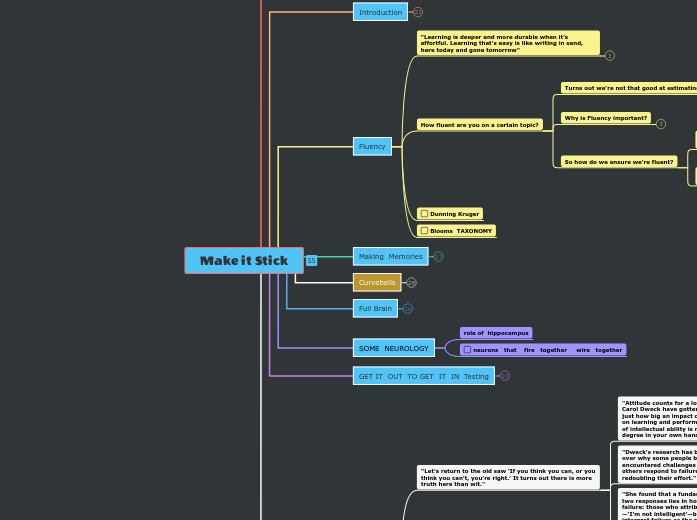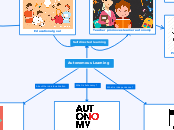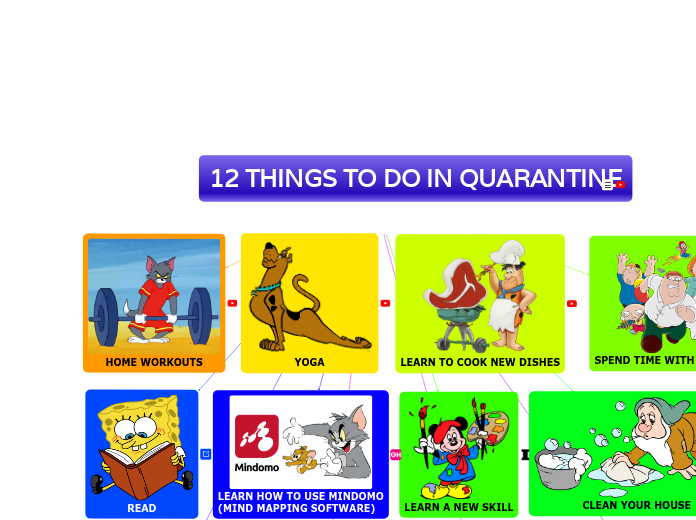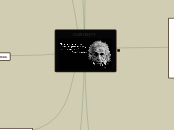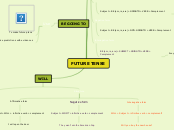Make it Stick
Mindset
Want to increase your abilities?
Change your mind first.
But there we have it.. Want to know what I think the number one factor in learning ability is?
Motivation is a function of wanting something AND believing that you can achieve it.
PS. A lot of my coaching clients come to me for help with procrastination.. Mindset plays a big part there too!
The believe that you can do it!
What are your thoughts on your own abilities?
Carol points out in her book just how much that is hindering our ability!
Most of us have a running track of 'self-talk' in our minds.. A lot of that talk is negative!
This is something important to keep in mind.. But also something we often ignore!
“Let’s return to the old saw ‘If you think you can, or you think you can’t, you’re right.’ It turns out there is more truth here than wit."
"She found that a fundamental difference between the two responses lies in how a person attributes their failure: those who attribute failure to their own inability—‘I’m not intelligent’—become helpless. Those who interpret failure as the result of insufficient effort or an ineffective strategy dig deeper and try different approaches.”
"Dweck’s research has been triggered by her curiosity over why some people become helpless when they encountered challenges and fail at them, whereas others respond to failure by trying new strategies and redoubling their effort."
"Attitude counts for a lot. The studies of psychologist Carol Dweck have gotten huge attention for showing just how big an impact one simple conviction can have on learning and performance: the belief that your level of intellectual ability is not fixed but rests to a large degree in your own hands."
GET IT OUT TO GET IT IN Testing
This isn't something I think we should dive deeply into during this Mind Map.. Except for one thing!
Tests sometimes make us doubt our abilities. And we shouldn't.
Carol Dweck's amazing book Mindset dives more into this but I just wanted to stop and say..
But as is pointed out here.. The test is more about where you are in a particular point in time! Not about your ability.
Actually I wasn't that good in school. At least until the stakes were high enough.
People sometimes feel that because they weren't good on tests or in a particular subject in school that they aren't capable..
“Sternberg’s concept of developing expertise holds that with continued experience in a field we are always moving from a lower state of competence to a higher one."
"Thus, a test may assess a weakness, but rather than assuming that the weakness indicates a fixed inability, you interpret it as a lack of skill or knowledge that can be remedied.”
"In tandem with Sternberg’s three-part model of intelligence, he and Grigorenko have proposed a shift away from static tests and replacing them with what they call dynamic testing: determining the state of one’s expertise; refocusing learning on areas of low performance; follow-up testing to measure the improvement and to refocus learning so as to keep raising expertise."
"His concept also holds that standardized tests can’t accurately rate our potential because what they reveal is limited to a static report of where we are on the learning continuum at the time the test is given."
SOME NEUROLOGY
neurons that fire together wire together
role of hippocampus
Full Brain
FEYNMAN PRINCIPLE Brain feeling full? Take some time to explain what you're learning to someone else..
So what might this look like for you?
But for you it could be through note taking and talking out loud, teaching it to a friend or creating a super in depth Hollywood level documentary on it! It's up to you.
Explain medical terms to a 5 year old/ patient
I believe that if you can't explain something in a basic way then you probably don't know it well enough..
I sometimes visit that to get inspiration (and to learn new things).
Reddit has a section called 'Explain like I'm 5' where experts take complex topics and break them down to simple terms!
This has been a superpower for me!
Plus these videos give me feedback on how clear my explanations are..
My recall-ability has also increased dramatically..
My ability to make connections between content has skyrocketed.
Developing a practice of teaching what you learn is incredibly helpful..
“In a cartoon by the Far Side cartoonist Gary Larson, a bug-eyed school kid asks his teacher, ‘Mr. Osborne, can I be excused? My brain is full!’
"The more you can explain about the way your new learning relates to your prior knowledge, the stronger your grasp of the new learning will be, and the more connections you create that will help you remember it later.”
"However, if you practice elaboration, there’s no known limit to how much you can learn. Elaboration is the process of giving new material meaning by expressing it in your own words and connecting it with what you already know."
"If you’re just engaging in mechanical repetition,it’s true, you quickly hit the limit of what you can keep in mind."
Curveballs
Short term impediments make for stronger learning. 'Desirable Difficulties'.
What does this look like in the real world?
Even if I wasn't going to be the best person to do it long term it gave me the most comprehensive look into everything the company did! Which is invaluable long term. (Even though it was frustrating at first).
When I first started my advertising business I wanted to learn EVERYTHING from scratch..
Email Marketing
Offer Creation
Landing Page Building
Split Testing
Paid Advertising
Copywriting
Graphic Design
Often we'll watch a video of how to do something step by step and just follow along with the video vs shutting off the video and starting from scratch!
Instead of practicing something via repetition we want to make that thing more difficult..
This opens an interesting line of thinking.. When do we need to 'know' something and when do we just need to get something done?
Perhaps by learning it deeply you'll spot something you might not have otherwise..
Perhaps you could create a product or service from the task and add it to your offerings..
Maybe the task isn't necessary..
A more efficient way to do the task..
But if you're planning to do it more than once it will be worth it long term to learn the thing deeply..
So if you're just doing something once don't bother to take the time to learn it deeply or practice it in a more difficult 'less tutorial video' way.. It's not a good time investment!
I often think of this like a programmer would.. If you have to do it twice it's better to write some code to do it!
When we're learning something new we often want to make the process as easy as possible..
YouTube is an amazing tool.. But just because we've been able to follow a video doesn't mean we 'know' the thing!
Today (outside of school) this looks like learning via following a YouTube video step by step!
“When the baseball players at Cal Poly practiced curveball after curveball over fifteen pitches, it became easier for them to remember the perceptions and responses they needed for that type of pitch: the look of the ball’s spin, how the ball changed direction, how fast its direction changed, and how long to wait for it to curve."
"It was more challenging for the Cal Poly batters to retrieve the necessary skills when practice involved random pitches. Meeting that challenge made the performance gains painfully slow but also long lasting.”
"It is one skill to hit a curveball when you know a curveball will be thrown, it is a different skill to hit a curveball when you don’t know it’s coming. Baseball players need to build the latter skill, but they often practice the former, which, being a form of massed practice, builds performance gains on short-term memory."
"Performance improved, but the growing ease of recalling those perceptions and responses led to little durable learning."
Making Memories
Looking to learn something? Retrieve the information! (Again and Again).
Let's give it a try!
hippocampus
What are the three main points we've learned so far in this video?
How might it work?
Learning from a mentor: after the session try to go over the conversation in your head.
When watching a video: pause the video and try to remember the main points.
When reading a book: close the book and try to remember what you just learned.
This is the first strategy we'll employ when trying to learn a new subject..
This action synched up the knot of learning.. Each time you retrieve something it gets a little tighter and a little tighter!
Retrieval (or remembering what you've read listened too or watched) without reference!
“A child stringing cranberries on a thread goes to hang them on the tree, only to find they’ve slipped off the other end."
"To be most effective, retrieval must be repeated again and again, in spaced out sessions so that the recall, rather than becoming a mindless recitation, requires some cognitive effort. Repeated recall appears to help memory consolidate into a cohesive representation in the brain and to strengthen and multiply the neural routes by which the knowledge can later be retrieved.”
"Today, we know from empirical research that practicing retrieval makes learning stick far better than reexposure to the original material does. This is the testing effect, also known as the retrieval-practice effect."
"Without the knot, there’s no making a string. Without the knot, there’s no necklace, there’s no beaded purse, no magnificent tapestry. Retrieval ties the knot for memory. Repeated retrieval snugs it up and adds a loop to make it fast."
Fluency
Blooms TAXONOMY
Dunning Kruger
How fluent are you on a certain topic?
So how do we ensure we're fluent?
Then we're going to add in some of the practices inside this book!
But they lead to real brain changes vs temporary learning!
These practices end up being more energy and attention demanding..
Start by throwing away most of the study practices that are so common..
Taking the same practice test over and over
Cramming the night before a test
Re-reading a particular text
Why is Fluency important?
Being familiar with a topic can give you a false sense of security that you understand it.. Leaving you open to making decisions on bad information!
Often you'll need to make decisions quickly.. Without time to reference material that you once read!
Let's say your job is to make decisions..
(Most high paying jobs involve decision making).
Turns out we're not that good at estimating this..
But when it comes time to take action on a certain piece of information we need to be FLUENT not FAMILIAR..
When we re-read something it gives us a feeling of 'familiarity' that can often mask as fluency!
“Learning is deeper and more durable when it’s effortful. Learning that’s easy is like writing in sand, here today and gone tomorrow"
"Rereading and massed practice give rise to feelings of fluency that are taken to be signs of mastery, but for true mastery or durability these strategies are largely a waste of time.”
"Rereading text and massed practice of a skill or new knowledge are by far the preferred study strategies of learners of all stripes, but they’re also among the least productive. By massed practice we mean the single-minded, rapid-fire repetition of something you’re trying to burn into memory, the ‘practice-practice-practice’ of conventional wisdom. Cramming for exams is an example."
"We are poor judges of when we are learning well and when we’re not. When the going is harder and slower and it doesn’t feel productive, we are drawn to strategies that feel more fruitful, unaware that the gains from these strategies are often temporary."
Introduction
Mind Mapping
Following along will help you learn more, remember better and apply these books to your life.
Find the process of HOW I Map plus all 50+ Mind Map templates (including this one) at the link below!
Get the most out of these Mind Maps by following along..
Everyone want's to learn better and remember longer..
What would life be like if you had strategies that would help you learn more and remember longer?
But learning sometimes requires hard mental work.. That's what we're going to talk about today!
But they aren't easy.. Watching videos, listening to audiobooks and reading is easy!
The strategies in this book are proven (not only by the scientists but as I've tested them).
Over a lifetime you would probably save years of your life.. Maybe even get the promotion, succeed in business or accomplish your goals faster!
How much time are you spending learning?
That adds up to quite a lot of our lives..
Most of us probably spend at least a few hours a day reading, watching videos or studying!
Especially if you're watching this video!
Something you want to learn that will make your life better in some way!
There is some thirst for knowledge..
“People generally are going about learning the wrong ways. Empirical research into how we learn and remember shows that much of what we take for gospel about how to learn turns out to be largely wasted effort."
"While much remains to be known about learning and its neural underpinnings, a large body of research has yielded principles and practical strategies that can be put to work immediately, at no cost, and to great effect.”
"This is a book about what people can do for themselves right now in order to learn better and remember longer."
"But there’s a catch: the most effective learning strategies are not intuitive."
"At the same time, this field of research, which goes back 125 years but has been particularly fruitful in recent years, has yielded a body of insights that constitute a growing science of learning: highly effective, evidence-based strategies to replace less effective but widely accepted practices that are rooted in theory, lore, and intuition."
"Even college and medical students—whose main job is learning—rely on study techniques that are far from optimal."
Main topic
